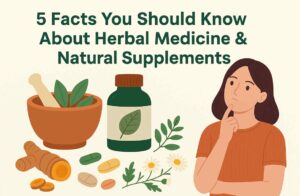
B25015 I By M. Faisal Hossain, BPharm, MPharm, PhD
Introduction: A New Era of Health Consciousness
In today’s wellness-focused world, more people—especially younger generations—are turning to herbal medicine and supplements to support their physical and mental health. Whether using elderberry syrup for immunity or taking ashwagandha to ease stress, natural remedies are back in the spotlight.
But this shift isn’t just a passing trend. It reflects a deeper movement toward cleaner living and preventive care..
This guide isn’t here to scare you—it’s here to help you stay informed and safe. By understanding the facts about herbal and natural supplements, you can make smart decisions about your health.
What Are Herbal Medicine & Dietary Supplements?
Herbal medicine involves using plant parts—leaves, roots, seeds, flowers—for healing.
Dietary supplements include not only herbs, but also:
- Vitamins and minerals (e.g., vitamin D, magnesium)
- Probiotics and digestive enzymes
- Amino acids and omega-3 fatty acids
In the U.S., these all fall under dietary supplements, which are regulated differently from prescription drugs.
1. What Is Herbal Medicine?
Herbal medicine uses plant-based substances to help treat or prevent health conditions.
Common examples:
-
Ginger – Helps with nausea and digestion
-
Echinacea – Often used to prevent or shorten colds
-
Ashwagandha – Helps manage stress and anxiety
While many herbal remedies have been used for centuries, not all are backed by modern scientific evidence. Effects can vary based on dosage, quality, and the individual.
2. Benefits
When used properly, herbal and natural supplements can offer many benefits, including:
- Boosting immunity and digestive health
- Providing antioxidants and essential nutrients
- Reducing inflammation and oxidative stress
- Being more affordable and accessible than many pharmaceuticals
Examples:
- Omega-3 supplements may support heart health
- Curcumin (in turmeric) is being studied for anti-inflammatory properties
- Probiotics can improve gut function and immune support
⚠️ Reminder: The key is safe use—not all supplements are effective for everyone, and more is not always better.
3. FDA Regulation: What You Should Know
In the U.S., dietary supplements are not regulated like prescription drugs. That means:
- No FDA approval is needed before products hit the market
- Manufacturers are responsible for their own product safety and labeling
- The FDA can only take action after a supplement is proven harmful or mislabeled
According to the FDA: “Dietary supplements are not intended to treat, diagnose, prevent, or cure diseases.”
Bottom line: You need to do your own research and choose brands that are transparent and trustworthy.
4. Misbranding & Adulteration: A Hidden Risk
Not all “natural” products are what they claim to be. Some have been found to contain:
- Hidden prescription drugs (like steroids or stimulants)
- Dangerous levels of heavy metals (like lead or arsenic)
- Incorrect or misleading dosages or ingredients
This is especially common in products marketed for:
- Weight loss
- Sexual enhancement
- Bodybuilding
To stay safe:
- Look for USP Verified or NSF Certified products
- Avoid anything making bold “miracle cure” claims
- Buy only from reputable, transparent companies
5. Safety and Drug Interactions
Just because something is natural doesn’t mean it’s always safe, especially when combined with prescription medications.
For example:
- Combining St. John’s wort with certain antidepressants can cause a dangerous condition called serotonin syndrome—a potentially life-threatening buildup of serotonin in the body.
- Taking Ginkgo biloba concurrently with warfarin significantly increases the risk of bleeding.
- Calcium and iron supplements can interfere with certain antibiotics
📌 Tip: Always talk to your doctor or pharmacist before adding a supplement to your routine, especially if you’re on other medications or managing a health condition.
Many Modern Drugs Came From Nature
It’s true—many prescription medications we rely on today have natural origins:
- Aspirin was derived from willow bark
- Penicillin came from mold
- Morphine was originally extracted from the opium poppy
This reminds us: Nature is powerful, but needs to be used wisely, with the support of science and safety standards.
Final Thoughts: Be Smart, Be Safe, Be Informed
Herbal and natural supplements can be part of a healthy lifestyle—but they aren’t a cure-all, and they’re not automatically safe or effective just because they’re “natural.”
Before taking any supplement:
✅ Do your research
✅ Look for third-party testing (USP, NSF)
✅ Discuss with your healthcare provider
✅ Watch out for drug interactions
Let’s embrace natural health—with evidence, balance, and awareness.
References
- FDA – Dietary Supplements
- NIH – Office of Dietary Supplements
- NCCIH – Herbs at a Glance
- NCCIH – Dietary and Herbal Supplement
- USP – Supplement Verification
Acknowledgment:
We used ChatGPT by OpenAI to refine grammar and improve readability.
Note:
This content is for informational purposes only and is not intended as medical advice. Always consult your healthcare provider before starting any supplement.
Share Your Experience
Have you ever used this supplement? We’d love to hear your story!
✅ Did it help?
⚠️ Any side effects?
💊 What dosage and form did you use?
Your comments help others and contribute to a growing database of real-world evidence.
Thank you for sharing!
